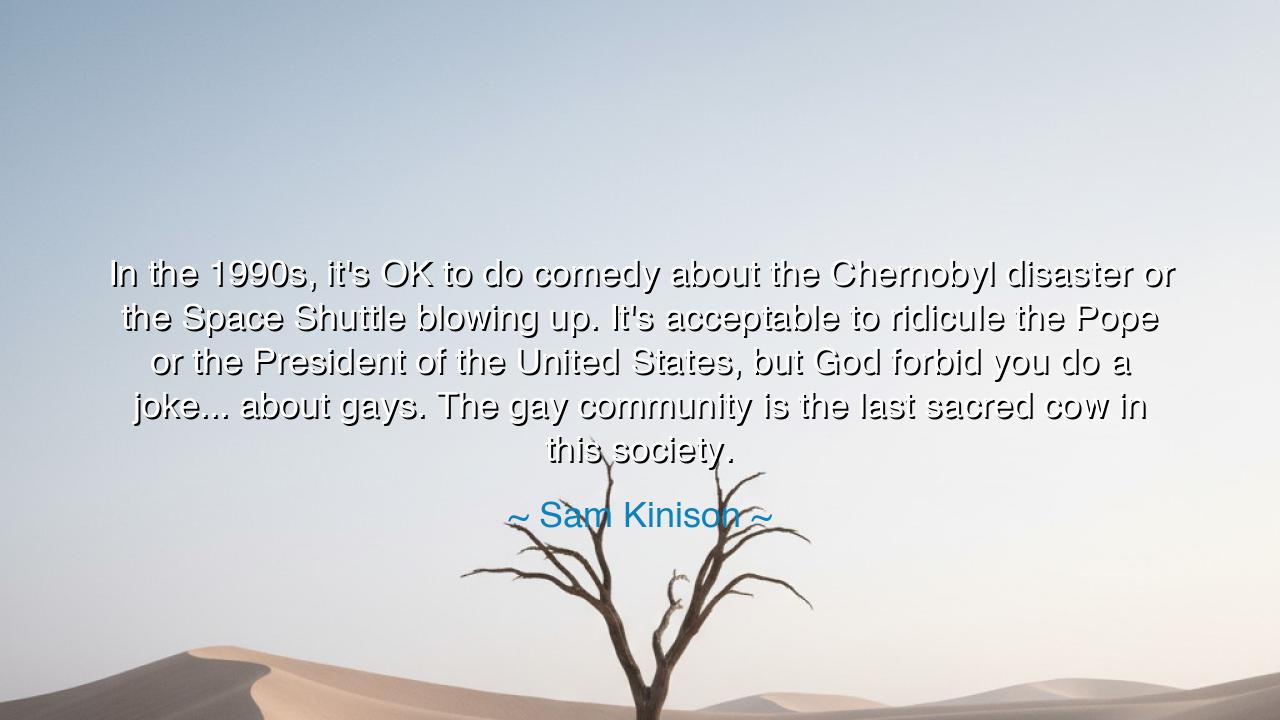
In the 1990s, it's OK to do comedy about the Chernobyl disaster
In the 1990s, it's OK to do comedy about the Chernobyl disaster or the Space Shuttle blowing up. It's acceptable to ridicule the Pope or the President of the United States, but God forbid you do a joke... about gays. The gay community is the last sacred cow in this society.






O seekers of truth, gather your hearts and minds, for I bring you words spoken by Sam Kinison, a man whose voice cut through the fabric of society with raw and unflinching honesty: "In the 1990s, it's OK to do comedy about the Chernobyl disaster or the Space Shuttle blowing up. It's acceptable to ridicule the Pope or the President of the United States, but God forbid you do a joke... about gays. The gay community is the last sacred cow in this society." These words, though spoken in the modern age, speak to a deeper truth about society, taboos, and the shifting boundaries of comedy and respect. Kinison's challenge reveals the contradictions within our culture, where some things are open to ridicule, while others remain beyond the reach of satire, creating a sacredness around certain topics that denies the freedom to question or laugh.
In the ancient world, humor was seen as a tool of both enlightenment and reflection. The Greek playwrights, particularly Aristophanes, used comedy to challenge the gods, to mock the powerful, and to question societal norms. The gods themselves, though revered, were not above ridicule in the eyes of the comic stage. The people of Athens could laugh at the absurdities of their rulers, their leaders, and even the divine, for through laughter they revealed the flaws of society and opened the door to reform. Comedy was not just a means of entertainment—it was a weapon, a tool for progress, and a way to expose hypocrisy.
Consider, O children, the example of Socrates, who was condemned by the people of Athens, not for his actions, but for his ideas—ideas that shook the very foundation of the city's beliefs. Even in the face of trial, Socrates never shied away from questioning the gods and the very order of society. The ancient comedians did not hesitate to turn their gaze upon the divine, upon kings, and upon those in power, for they understood that true freedom comes not from reverence for sacred figures but from the ability to question, to provoke, and to laugh at the things that others hold sacred. In the words of Kinison, the modern world is in danger of creating new sacred cows—things we are not allowed to laugh at, things that are immune to the questions that comedy seeks to raise.
Kinison’s words reveal a deep paradox in our modern society: taboos exist, but not necessarily in the places one might expect. In an age when public figures can be ridiculed without fear, when disasters and tragedies are fodder for the comedian’s craft, why is it that gays—a group that has historically faced so much oppression—remain off-limits for humor? The irony is not lost on Kinison, who exposes the double standard that exists in our treatment of marginalized communities. Gays are not to be joked about, not because they are above criticism, but because society has placed them in a position of sacredness—a position of protected vulnerability, where they are seen as untouchable, not by power or might, but by fear and political correctness. It is the last sacred cow of the modern era, the last area where laughter is silenced for fear of offending a deeply wounded group.
Let us also turn to the story of Oscar Wilde, a man who dared to challenge the societal norms of his time, often using wit and humor as tools of defiance. Wilde’s plays were filled with biting satire, targeting the elite, the aristocracy, and even the institution of marriage. Yet, Wilde himself was a victim of society's hypocrisy, as his sexual orientation—like that of countless others—was the subject of derision and oppression. Wilde’s life was an example of the tragic consequences of a society that could not laugh at itself, but could only condemn those who were different. Wilde’s own suffering was borne from a society that did not understand that laughter could be used not to oppress, but to liberate, to bring light to the things we dare not speak of.
O children of wisdom, the lesson here is clear: comedy has always been a tool of enlightenment, a way to expose the truths that society prefers to hide. Sam Kinison’s challenge calls us to reflect on the sacred cows we have placed in our own society. Are there things we protect from laughter, from the questioning that is vital to our growth? Are there groups we hold above reproach, not because they are deserving of reverence, but because we fear the discomfort that comes with truth? It is not that we must laugh at the oppressed or marginalized, but that we must question why some things are shielded from the very scrutiny and satire that others endure.
So, O seekers, let this wisdom guide you: laughter is not a weapon of harm, but a tool of liberation. Comedy can open the space for difficult conversations, for questions, and for change. Do not fear to laugh at the absurdities of the world, at the hypocrisies and injustices that often go unnoticed. But let us also remember that the true power of comedy lies not in silencing those who are different, but in breaking down the walls that separate us. Embrace the uncomfortable, challenge the sacred cows, and know that in doing so, you will open the door to a deeper understanding and a more just world.






AAdministratorAdministrator
Welcome, honored guests. Please leave a comment, we will respond soon